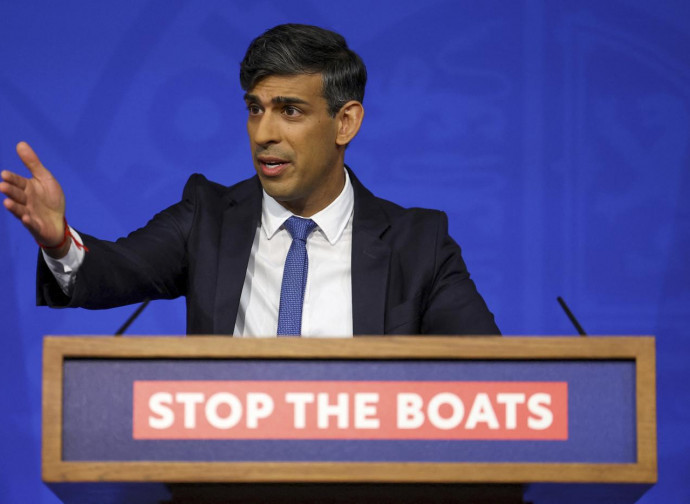London's Rwanda plan will save lives
The British Parliament has finally passed the law that defines how and when a selection of illegal migrants will be transferred to Rwanda pending the evaluation of their asylum requests. Amnesty International and other NGOs protest, but misrepresent a law that will save lives.

Late evening on 22 April, the British government finally obtained the House of Lord’s approval of the law that defines the terms and conditions for the transfer to Rwanda of some of the illegal migrants who justify their irregular entry to the United Kingdom by declaring that they are fleeing from war, persecution and extreme situations of violence and therefore merit asylum.
Two years have passed since the then Boris Johnson-led government announced on 14 April 2022 that it had signed such an agreement with the Rwandan government. But local and international authorities and institutions had immediately intervened to condemn the initiative and raised legal obstacles. Johnson and successive prime ministers, however, up to the current Rishi Sunak, have always defended the project and assured that, despite the setbacks, they would carry it out as they did. Prime Minister Sunak claims that everything has been ready for some time and that the first departures will take place as early as 10-12 weeks from now.
Even the Rwandan government, after the news spread, assured that for two years the Hope Hotel and other facilities have been ready to receive guests, well equipped and staffed with the necessary personnel. Free to come and go at will (they are therefore not closed refugee camps), it is there that asylum seekers transported to Rwanda will await the outcome of their applications, which will be examined by local staff. Those who are granted asylum will receive economic and other forms of support from the British government for five years so that they can integrate into the economic and social life of the country. Those whose applications are rejected will be able to apply to remain in Rwanda in some other capacity or will be transferred to their countries of origin or other states where they have a right to reside.
But once again, the British government is accused of violating international law and condemning with inhumane disregard desperate people seeking security from an unsafe future. Among the first statements of condemnation, followed by others, were those of the non-governmental organisations Freedom from Torture, Amnesty International and Liberty, which issued a statement saying: 'This disgraceful bill violates and makes a mockery of the constitution and international law by exposing torture survivors and other refugees to the risk of an unsafe future. The British government must make up its mind to treat refugees decently". A few hours after the vote, Filippo Grandi, UN High Commissioner for Refugees, and Volker Türk, UN High Commissioner for Human Rights, also joined the protests with a joint statement calling on the UK to abandon the relocation plan, saying that if implemented, it will have a detrimental impact on the refugee protection system, undermine international cooperation and set a worrying precedent.
The assumption of such convincing statements is that Rwanda, which again this year won the record for being the safest African country, according to the report 'Africa: Crime Index by Country 2024', is a dangerous country where human rights are not respected. Those who are 'deported' there will come to a bad end. This is the only way to justify the accusations against the British government of inhumane behaviour and violation of international law (incidentally, the position of High Commissioner Grandi is surprising, since for years he has not missed an opportunity to praise and thank countries such as Rwanda: so poor and yet such models of welcome and unconditional dedication to refugees, to be taken as an example).
But the case of Great Britain highlights above all, and even more than others, the falsehoods of a narrative deliberately bent on misrepresenting the facts in order to justify to the bitter end the illegal migratory flows towards Europe. Among those who, in various capacities, take an interest in the phenomenon and deal with it, everyone, without exception, knows that only a small proportion of asylum seekers are really fleeing for their lives and freedom. They know this because both the countries of origin, most of which are not ravaged by war and persecution, and the consistently low percentages of approved asylum applications prove it. In 2023, the countries from which the most asylum seekers arrived in Britain included, for example, Pakistan, India and Bangladesh.
Moreover, as the British government has repeatedly pointed out, in fact all asylum claims of people landing on British shores from France and crossing the Channel in small boats - already more than 6,000 since the beginning of 2024 - could be rejected, even if they came from countries at war or from which they had fled because of persecution. In France, in fact, they were not only already safe, but they were able to ask for and obtain asylum because France has ratified the Geneva Convention which commits it to receive refugees and not to send them back to countries where their life or freedom would be in danger. So they make the crossing not to save themselves nor to have the opportunity to seek asylum. They do it because they want to enter Britain and stay there. That is why the British authorities are certain that the prospect of being transferred to Rwanda will surely act as a deterrent.
As in the Mediterranean Sea, the crucial complementary effect of the law will be to save lives. A few hours after the law was passed, a boat that had set off overloaded from a point on the French coast near Boulogne ran aground on a sandbank; five people - three men, a woman and a child - died crushed by the weight of the other passengers. 'These tragedies must end,' said British Home Secretary James Cleverly, 'I am not prepared to accept a situation that costs so many lives. My government is doing all it can to put an end to the activities of the criminal organisations that run the illegal journeys'. The French authorities reported that during the night of 22-23 April, dozens of boats set sail for England, taking advantage of favourable weather conditions and calm seas.
Migration, a weapon to destroy national identities. The case of Italy
The recent clash between Italy and France over the ships which collect migrants in the Mediterranean skippered by Non Governmental Organizations (NGOs) is only the symptom of a wider war which aims to dissolve the identity of Europe. Italy is the main battlefield as Cardinal Biffi warned twenty years ago.
Covid-19 has brought more migrants to the Mediterranean
The figures decreased in April, surely due to bad weather and the pandemic. However, in May numbers of illegal immigrants entering the EU from various Mediterranean routes tripled compared to the previous month. From January to May, 5,500 cases have been recorded, virtually triple the number for the same period in 2019. Frontex has reported this, but individual countries are not responding

